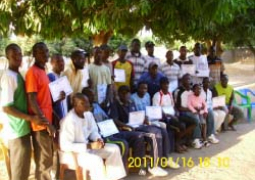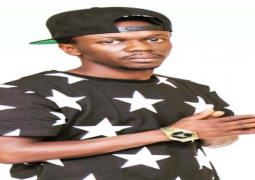Bakau Kachikally Pool is a house hold name that has been
there for ages with different types of crocodiles in the pond just at the end
of Bakau town. The spiritual aspect of this has shown since time immemorial but
in the 70s a new trend started to show with the advent of tourists who also
became quite attracted to the place taking cognizance of the spiritual and
social aspects. Many people got what they wanted especially barren women who
were scientifically proven to be so and came to perform the spiritual rights
have been able to get kids. Thousands of visitors have also gained a lot from
their visits to the site. The site remains spiritual and social for all. Dodou
Bojang a member of the Bojang family, the custodians and the manager of the
Kachikally Crocodile Pool takes us through the history, the work done, their
desire for the place and the help Kachically it renders and their desire to
help Kartong Folonko Sacred Pool take its position in society.
[endif]
S&D:
What is the secret behind the Bojang family being custodians of the Kachikally
Pool?
[endif]
Dodou Bojang: the oral history of the place says the sacred
pool is blessed by the Spirit Kachickally who, 500 years ago when their
ancestors first settled in the area, appeared to them as an elderly woman
seeking help in rescuing her child from the pool. The Bojang family helped and
she then revealed to them that she was actually a spirit who lived in the
forest surrounding the pool. She told them, "I have tested you to prove whether
your family deserves custodianship over the pool and its healing powers, and
you have passed the test, so your family will forever be responsible for the
care of this sacred area." My father Ousman Bojang posted me here to take care
of the spiritual and social aspect of the pool.
[endif]
S&D:
How come Kachikally sacred pool is becoming social?
[endif]
Dodou Bojang: Kachikally is not a tourist attraction it is a
sacred place. During the early 70s when tourists started visiting The Gambia it
became more attractive to tourists because of the environment, the friendliness
of the crocodiles and the spiritual importance. My family took it as an issue,
when they started gaining something from it they decided to improve on it to
make it more attractive. I was then posted there by my father, Ousman Bojang to
see what attractions could be added for the sake of cultural tourism as
promoted by
[endif]
S&D:
How did you get the pool so beautiful?
[endif]
Dodou Bojang: We started rehabilitating the pool to make it more Gambian. We dug the pool and rebuilt it with boulders. We started building the museum in 2004/5 to add some value to the sacred side by Yankuba Touray the then SoS for Tourism. We spoke to him to give us a technical assistance to display our artifacts of our museum
S&D:
Was there any professional touch to get the pool to such a standard?
[endif]
Dodou Bojang: Hassum Ceesay, at the Art and Culture
Department now Permanent Secretary, was posted here and we set up the museum
and by the help of God we are number one museum today in the country. We are a
member of museums all over the world. We have funds from ASCO for training of
museum assistance and museum management.
[endif]
S&D:
How do you help barren women?
[endif]
Dodou Bojang: We work with the Barren Women's Association,
("Kanyilen") about 75 of them. As you know the site is good for fertility of
women. We perform a weekly medication for barren women, loc ally known as
"Kanyilen" at the pool.
[endif]
S&D:
Are there other developments you embark on?
[endif]
Dodou Bojang: We produce books, brochures, books on
Biodiversity as a guide to Kachikally pool. Makasutu Wild Life Association
helped us with the wild life. We also made brochures on the history of the
pool, which we sell to the tourists. We have created a Website known as - www.
Kachikilly.com where one can access all information on the Kachikally pond. We
have administrative office which runs the financial and other aspects of the
site.
[endif]
S&D:
Have you any further history about the pool?
[endif]
Dodou Bojang: In the early 15/16 centuries the pool area was
the only source of drinking water as well as it was highly spiritual. Now we
have two administrative levels, one for the spiritual and the other side the
political, which is the tourism area which generates money in The Gambia.
[endif]
S&D:
Have you any constraints?
[endif]
Dodou Bojang: Yes,
there are lots of problems. The access roads remain a big constraint. Gambia
Tourism Authority told us they have done the consultancy and sent people to
come and do survey. This is yet to start and we have been on tenterhooks since
then. The drainage to the pool is completely covered and the sewage remains a
big problem.
[endif]
S&D:
Have you done anything about the poor drainage that smells around the pool?
[endif]
Dodou Bojang: Due to the poor drainage system, we made an
agreement with Yankuba Touray and there was plan to divert the drainage system
if funds were available.
[if !supportLineBreakNewLine]
[endif]
S&D:
What would visitors that came here long ago remember about Kachikally pond?
[endif]
Dodou Bojang: The Spirit Kachikally had instructed our Bojang family to find an animal to live in the pool. We tried in those days to get crocodiles known as Nile Crocodiles, (crocodylus niloticus). It is widely known for its healing powers and as a place where people pray for blessings. It is a place of last resort for barren women who wish to conceive. Many others with long term ailments or misfortunes come to Kachikally Sacred Pool. Many make a humble petition to the Bojang family by bringing Kola-nuts and other small offers. Bojang women would wash the misfortune person with water from the natural spring. In the case of a barren woman, after washing she is advised to remain faithful to her husband and not to shake hands with other men for a year. Faithfulness and prayer over the next year will bring forth a child. Many of our visitors have gained favours since and have reported back, some have got their children.
S&D:
Do the crocodiles go?
[endif]
Dodou Bojang: Yes, they control their own population. They
allow others to go, but if they go to residential areas we go for them. They
are not over crowded either, the pool has been here for many, many years and
the crocodiles are still here. There are about 90 of them and every year they
lay about 30 to 35 eggs. Some times some would eat their babies and some wild
birds do catch their babies and eat them, a jungle life - survival of the fittest.
We also allow some to go to rivers if they want to migrate.
[endif]
S&D:
Is there anything that makes you happy about the pool?
[endif]
Dodou Bojang: Yeah! As I said, we are connected to it
spiritually and we are happy that man is connected to the spiritual. People tend
to fear crocodiles but we talk to them. If we want to repair the pool we speak
to them to move on one side, they move to where we want them to move. We shake
their hands, they also understand us.
[endif]
S&D:
Has the pool got anything to do with schools?
[endif]
Dodou Bojang: Yes of course! The crocodile pool is part of
the schools' Social and Environmental Studies curriculum. We believe the school
should not be cut off from culture. Many schools come here to see for
themselves our culture at work.
[endif]
S&D:
Are there days you get upset with happenings here?
[endif]
Dodou Bojang: I work here from to .
I am here on two aspects. I feel upset when tourists and visitors talk about
the stench of the sewage and the poor condition of road to the site, it bothers
me a lot. Many visitors come to this place from other countries and even the
government sends their own v. i. p. visitors like those of the Chief of Defense
Staff that were in the country recently.
[endif]
S&D:
Is there any way the condition can be improved?
[endif]
Dodou Bojang: I have worked relentlessly in the past years.
I believe it is only through hard work one can achieve your aim. Our interest
is not only based on the improvement of this pond but we aim to develop that of
Kartong
[endif]
S&D:
What is wrong with Kartong Folonko Pool?
[endif]
Dodou Bojang: It is not functioning and it is very
unattractive. We are trying to give them a help in hand to up lift it and make
it a true historical site with lots of attractions. We want to share our
experience with them and with all sacred sites in the country we believe that
those are our identities. We are open to helping them to make the place viable
and retain its prestige. The Kartong one has we want to rescue the crocodiles
and train their people. We are working with
[endif]
S&D:
Do you want to appeal to any one for help?
[endif]
Dodou Bojang: We do not want to desecrate the area. Our
problem is the road. Not only our visitors come but state visitors too but the
road is embarrassing.
[endif]
S&D:
As the most visited place, what do you do with the proceeds?
[endif]
Dodou Bojang: We help some schools, hospitals, mosques and
churches. We pay salaries to 25 of our workers. We share with others as the
site was given to our family because of our generosity. The happiest man is the
man who serves humanity.
[endif]
S&D:
Do you want to add to what we have said that was not said?
[if !supportLineBreakNewLine]
[endif]Dodou Bojang: Spiritually, white women come here for
spiritual advice and those who are proved barren scientifically, go home and
get children. The spiritual aspect is fantastic we need to talk about it. We
have students from St. Mary's University doing Anthropology, we have link with
them.
[endif]
S&D:
I thank you for a marathon explanation.
[endif]
Dodou Bojang: You are welcome. It's very kind of you.



